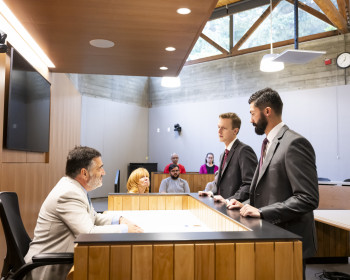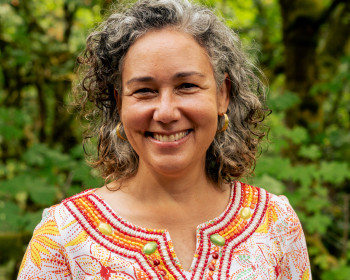Professor Bob Klonoff Completes Service to Federal Civil Rules Advisory Committee
Lewis & Clark Law professor Robert Klonoff completed six years of service as the academic member of the Federal Civil Rules Advisory Committee. Only one law professor in the nation serves on the 15-member committee, and the maximum period of service is 6 years. Professor Klonoff was acknowledged for his service by Chief Justice Roberts.
Open gallery

The Chief Justice of the United States, John G. Roberts, Jr., recently acknowledged Lewis & Clark Law professor Robert Klonoff for his six years of service as the academic member of the Federal Civil Rules Advisory Committee. Only one law professor in the nation is selected by the Chief Justice to serve on the 15-member committee, and the maximum period of service is 6 years.
The Civil Rules Committee drafts the Federal Rules of Civil Procedure that govern all federal district courts around the country. The committee is one of several committees established by the Supreme Court to study – and recommend changes to – the various federal rules, including civil, criminal, and appellate.
“I very much appreciate your contributions and the time you have been willing to invest in the work of this important committee,” wrote Chief Justice Roberts in a personal letter to Professor Klonoff. “Your thoughtful counsel has served the Advisory Committee and the judiciary well.”
“It has been a huge honor for me to serve,” noted Bob Klonoff. “Our work has had a major and immediate impact on the judiciary.”
Klonoff also served on a special Class Action Subcommittee of the Civil Rules Advisory Committee. The subcommittee took the lead on drafting substantial amendments to the federal class action rule. Those proposed amendments are now on track for final adoption (after review by the Supreme Court and Congress).
Professor Klonoff’s areas of expertise include class action litigation, civil procedure, and appellate litigation. He co-authored the first casebook on class actions (published by West) and just recently completed the fourth edition of that text. He also authored the West Nutshell on class actions (now in its fifth edition), as well as numerous law review articles, including “The Decline of Class Actions” for the Washington University Law Journal; “Class Actions in the Year 2026: A Prognosis,” for the Emory Law Journal; and “Class Actions Part II: A Respite from the Decline,” for the New York University Law Review.
He is the co-author of a leading text on trial advocacy and co-author of a West Nutshell on federal appellate practice. He has taught and lectured throughout the United States and in numerous foreign countries on class actions and other litigation topics.
Klonoff served as an Associate Reporter for the American Law Institute’s class action project, “Principles of the Law of Aggregate Litigation,” a work that is cited repeatedly by courts and scholars. In addition, he is a Fellow in the American Academy of Appellate Lawyers, and he served as a Reporter for the 2005 National Conference on Appellate Justice. He is also an elected member of the International Association of Procedural Law, and serves as an advisory board consulting editor of Class Action Litigation Report (BNA).
Professor Klonoff has extensive litigation experience and is often called upon as an expert witness on class action issues, including the British Petroleum Deepwater Horizon oil spill litigation, the National Football League Concussion litigation, and the Volkswagen Clean Diesel litigation.
Professor Klonoff joined Lewis & Clark Law School in 2007 and served as Dean of the institution from 2007 until 2014. Today he is the Jordan D. Schnitzer Professor of Law. Previously, he handled high profile class action litigation and U.S. Supreme Court cases for Jones Day. He has taught at Georgetown Law Center, the University of San Diego School of Law, and the University of Missouri-Kansas City School of Law. He also served as an Assistant to the Solicitor General of the United States, a post that gave him the opportunity to argue numerous cases before the U.S. Supreme Court. He received his JD from Yale University.
Law Communications is located in room 304 of Legal Research Center (LRC) on the law Campus.
MSC: 51
email jasbury@lclark.edu
voice 503-768-6605
Cell: 626-676-7923
Assistant Dean,
Communications and External Relations, Law School
Judy Asbury
Law Communications
Lewis & Clark Law School
10101 S. Terwilliger Boulevard MSC 51
Portland OR 97219

